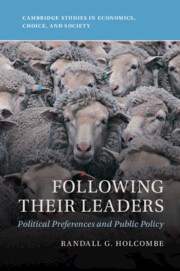Book contents
- Following Their Leaders
- Cambridge Studies in Economics, Choice, and Society
- Following Their Leaders
- Copyright page
- Dedication
- Contents
- Figures
- Tables
- Preface
- 1 Introduction
- 2 Instrumental and Expressive Voting
- 3 Influences over Preference Formation
- 4 Preference Aggregation through Voting
- 5 The Formation of Political Preferences
- 6 Anchor Preferences and Derivative Preferences
- 7 Preferences of Elites and Masses
- 8 Policies That Maximize Political Power
- 9 Patriotism, Propaganda, and the Public Interest
- 10 Implications for Democracy
- References
- Index
7 - Preferences of Elites and Masses
Published online by Cambridge University Press: 16 March 2023
- Following Their Leaders
- Cambridge Studies in Economics, Choice, and Society
- Following Their Leaders
- Copyright page
- Dedication
- Contents
- Figures
- Tables
- Preface
- 1 Introduction
- 2 Instrumental and Expressive Voting
- 3 Influences over Preference Formation
- 4 Preference Aggregation through Voting
- 5 The Formation of Political Preferences
- 6 Anchor Preferences and Derivative Preferences
- 7 Preferences of Elites and Masses
- 8 Policies That Maximize Political Power
- 9 Patriotism, Propaganda, and the Public Interest
- 10 Implications for Democracy
- References
- Index
Summary
While the policy preferences of the masses are purely expressive, the political elite actually make public policy, so the preferences they act on do have instrumental effects. If the masses adopt the policy preferences of the elite, that points to the question of what public policies the elite advocate to the masses. In the same way that economists simplify the motivations of firms to say that firms are profit maximizers, the political elite are power maximizers. That motivation starts with the recognition that politics is adversarial. In elections, some people win while others lose. The same is true in public policy issues. Some win while others lose. The motivation of the political elite is to keep the power they have, and to gain more. In most societies, the political elite is not a monolithic entity. Rather, there are competing members of the elite, with competing public policy ideas. Thus, the masses have a choice of anchors, but once they choose an anchor, most of their policy preferences are derivative of their anchors.
Keywords
- Type
- Chapter
- Information
- Following Their LeadersPolitical Preferences and Public Policy, pp. 117 - 138Publisher: Cambridge University PressPrint publication year: 2023

